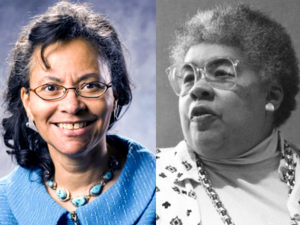CHHSM-sponsored Valerie Russell Lecture to Address Racism in Church and Society

Left: Camara Phyllis Jones, lecturer. Right: Lecture namesake Valerie E. Russell.
To emphasize its role as an advocate for social justice, the United Church of Christ’s Council for Health and Human Service Ministries is co-sponsoring the Valerie Russell Lecture, a key event at the UCC’s biennial General Synod, to be held June 30-July 4 in Baltimore, Md.
The free lecture, planned by the UCC’s Justice and Witness Ministries, take place Saturday, July 1, from 1:30- 3 p.m. at the Hilton Baltimore Hotel. The speaker is Camara Phyllis Jones, M.D., M.P.H., Ph.D., research director on social determinants of health and equity in the Division of Adult and Community Health for the National Center for Chronic Disease Prevention and Health Promotion. Jones will address “Unnatural Causes: The Toxic Effects of Racism on Church and Society.”
Jones is a family physician and epidemiologist whose work focuses on the impact of racism on the health and well-being of the United States. She advocates broadening the national health care debate to include not only universal access to health care, but also the social determinants of health, including poverty, and the social determinants of equity, including racism.
The event is on way CHHSM can “support the United Church of Christ and this important opportunity for Synod attendees,” says the Rev. Danielle Bartz, CHHSM’s associate for program/leadership development.
Jones’ work and address ties in well to the life and work of the Russell Lecture’s namesake. Valerie E. Russell was a tireless fighter for disadvantaged and disenfranchised persons who died in 1997 after a lifetime of advocacy for social change. The former head of the UCC’s Office for Church in Society, Russell‘s lifelong call to lay ministry was shaped by her experiences.
Observing that her “mother’s vision was shortened by racism and the limits it imposed,” Russell fought those limitations. In the 1960s, she was part of the group that started the Massachusetts chapter of the Southern Christian Leadership Conference, participated in the Selma March and the March on Washington, and learned to advocate against institutional racism from civil rights giant Dorothy Height.
“I think that faith is only real when it’s shaped out of every generation’s struggle,” Russell once said. “Every time has to redefine the moral imperative and what the gospel has to say to meet the challenges of that age.”
A stroke in 1993 changed Russell’s life. Resulting physical disabilities meant that she needed a wheelchair, which turned part of her focus to accessibility issues.
“There are so many places that don’t invite people in wheelchairs, and too often, the church is one of those places,” she told friends. “The church’s theology is about the broken body of Christ. I am outraged that our practice is so inconsistent with our theology. It is sad we violate the center of our faith and exclude so many of God’s people.”
A true saint of the church, Russell once reflected: “I believe that ministry is a work of the whole people of God. I think my role in that is to enable persons to find their own voices; to acknowledge their own courage in meeting and dialoguing with the stranger; in making an affirmation that we are all God’s children; and that whether we’re talking about war or AIDS, God doesn’t have any ‘good guys’ or ‘bad guys.’ God only knows that His — or Her — children are suffering.”
The lecture is sponsored by CHHSM, Justice and Witness Ministries, and the UCC HIV and AIDS Network (UCAN).
Join Our Mailing LIst
"*" indicates required fields
Follow on Facebook
Pension Boards appoints David A. Klassen as its President, CEO - United Church of Christ
www.ucc.org
The Pension Boards, an affiliated ministry of the United Church of Christ recently announced its appointment of David A. Klassen as its next President and